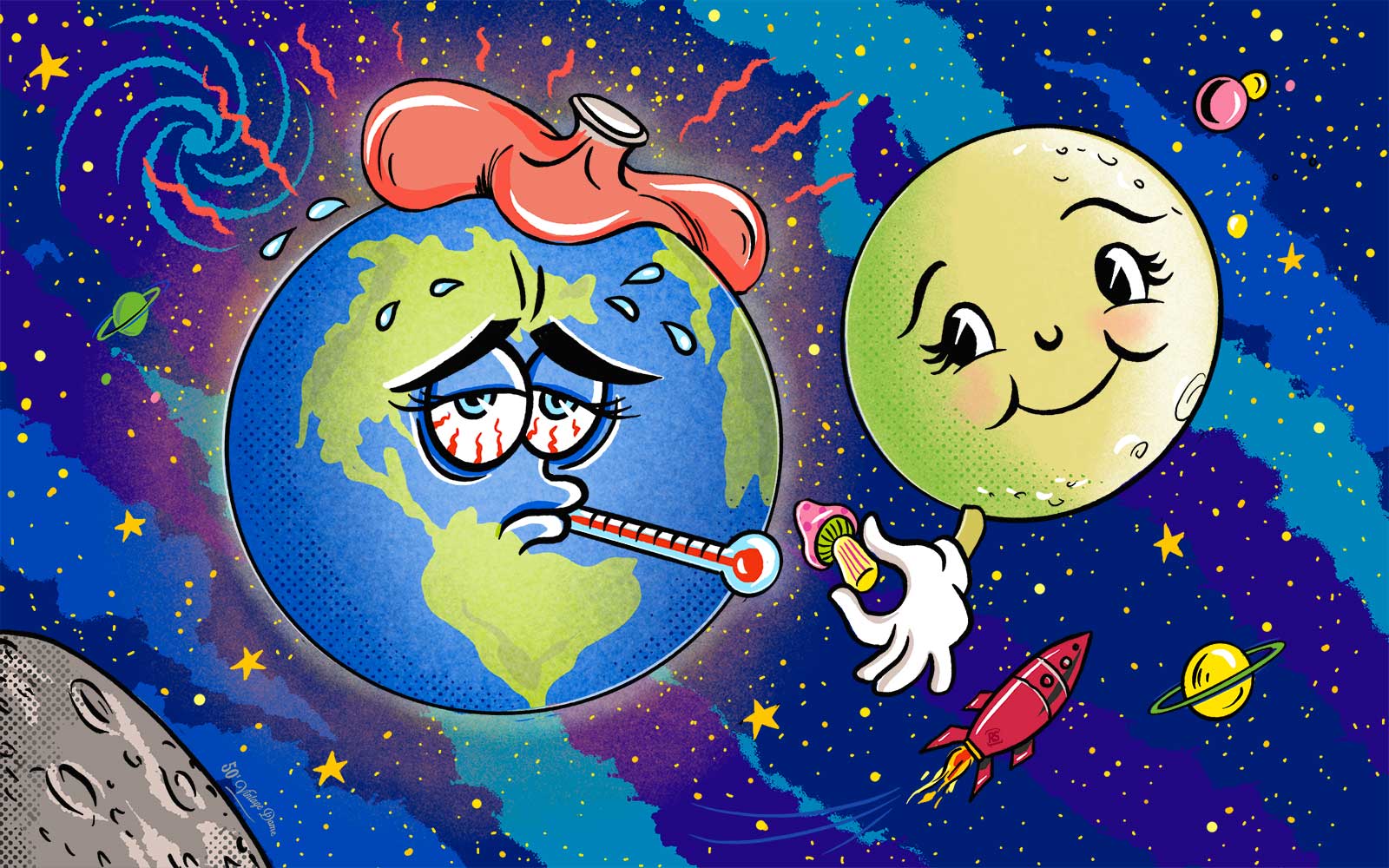Prominent psychonauts and leaders in the psychedelic community have been promoting the use of psychedelics as a means to change the world since LSD was first synthesized. One such proponent, Terence McKenna, speculated that psychedelics — particularly tryptamines — could induce a state of mind that connects a human to nature. This “Gaian Mind” gives human beings insight into the strains on the ecosystem, drawing on sympathetic feelings and inspiring action towards change. McKenna left his earthly body in 2000, but his ideas about psychedelics and climate change carried on through the work and ideas of many psychonauts and scientists after him.
While eating magic mushrooms might not stop the ice caps from melting, could tripping on psychedelics promote a more profound compassion for the earth? And could that oneness ultimately have a positive impact on climate change?
Are Psychedelics the Antidote to Climate Grief?
For many people, the current climate crisis is more than a political agenda. It’s a deeply felt state of grief. Witnessing the slow burn of the planet, the deforestation of tropical rainforests, ocean temperatures rising, and the extinction of precious wildlife is exhausting and disheartening. It can feel hopeless, as though humankind is so far removed from their connection to nature, that it is near impossible to restore and preserve what has been lost. Climate grief is the very real feeling of watching the world die around you and feeling as though impactful change is an insurmountable goal.
In Michael Pollan’s book How to Change Your Mind, he explores the benefits of psychedelic-assisted therapy with terminally ill patients. During these sessions, many people experienced transformative and impactful realizations that provided a better understanding, and acceptance, of death. Having this experience lifted depression in many cases, and gave people a new lease on life, for however long they had left on the planet. Fear was replaced with hope and peace, and their mental health dramatically improved.
In an interview discussing climate change, Pollan was asked if he believed psychedelics might help those that were dealing with the death of loved ones or with concerns for the future lives of generations. Pollan shared a case study of a woman working as an environmentalist for the World Resources Institute. This company created a software program that featured live footage of fires around the world. The goal was to determine whether or not land deals were being honored, particularly in areas of the Amazon. This woman was paid to watch the world burn in real-time and not surprisingly, this put her into a state of depression. She sought psychedelic therapy to help her cope, and although it didn’t wholly eradicate her grief, it did help her reset her frame of mind and continue on with her work.
Pollan said that while he cannot speak for this environmentalist’s unique experience, he believes there is widespread evidence that psychedelic use can inspire feelings of hope and connectedness. Knowing that others are fighting for a better world and enacting change that can genuinely make a difference is very powerful. The connection between psychedelics and climate change may be that intentionally using drugs to alleviate grief and depression can positively impact mental health.
A Clinical Viewpoint
Several clinical trials are currently studying the effects of psilocybin and ketamine on treatment-resistant depression, anxiety, and posttraumatic stress disorder (PTSD). One recent study, in particular, looked at how psychedelics can help people overcome the intense grief associated with the current climate crisis. By providing a connectedness to nature, people were compelled to reduce their destructive behaviors toward the earth and felt more inspired to take an active role in fighting against climate change. This experience left participants feeling more empowered and hopeful.
Psychedelics Promote Environmental Activity
Psychedelics have a way of inspiring wonder in the natural world. Anyone who has taken LSD, psilocybin, DMT or substances of a similar vein has probably never looked at a tree the same way again. When under the influence of a potent psychedelic substance, nature has a way of “talking” through its movement, sometimes appearing to be visibly breathing. Vice reported on the connection between psychedelics and climate change in 2019, citing a study done by scientists at Imperial College London on the correlation between psilocybin and feelings of environmental oneness. Just a single dose increased the feelings of nature connectedness, and those feelings continued to increase over time. One participant said:
“Before I enjoyed nature, now I feel part of it. Before I was looking at it as a thing, like TV or a painting…[But now I see] there’s no separation or distinction, you are it.”
When it comes to mental health, many professionals acknowledge the benefits of nature-relatedness to improved joy and happiness in one’s life. People who find time to explore and commune with nature report improved mental health and feel called to support and promote environmental activity for others. This connection continues to propel itself by encouraging more time to connect with nature, which encourages more environmentally conscious behaviors.
Psychedelics Can Help Humans Connect With Nature
When combining psychedelics and nature, humans’ relationship to the rocks, trees, sand, plants, and animals only strengthens. A psychedelic experience can shrink the ego, which reduces one’s feelings of “I am” and softens them to feelings that more closely resemble “We are.” This logic is dubbed “Egoism to Ecoism” and seems to be reflective of the psychedelic experience.
“The ego typically perceives the world as if there’s a single subject – you – while everything else is an object. This sort of egotism, I think, is at the heart of our environmental crisis – our ability to objectify nature and see ourselves as standing outside of it. Once you objectify something, it becomes a thing you can use for your own purposes, that you can exploit. So, to the extent the psychedelic experience seems to bring down these walls of ego and open up this powerful sense of connection, it has – at least theoretically – the potential to shift consciousness around the environment.”
Michael Pollan
Researchers have found that overloading the public with facts about the climate crisis doesn’t incite much change, but rather spurs immense feelings of overwhelming despair. This begs the question: are psychedelics a possible antagonist to dedicated action towards climate change? It seems that there is absolutely potential for this. As more and more people consume psychedelics and experience nature-connectedness, more and more people are likely to make changes in their lives and inspire that change in other people. Plant a seed and watch it grow.
When it comes to climate change, there is also the view that Mother Earth knows what she’s doing and has been changing and morphing for millions of years. Earth knows how to transmute and transform and birth new landscapes and oceans over time. She always regenerates. Perhaps there is something to be said for coming to terms with this concept while inspired by a psychedelic journey. Maybe in addition to making personal changes to limit environmentally destructive behaviors, it’s also good to trust that this planet will always find a way to create new life.
Have you ever experienced psychedelics in nature? We’d love to hear from you. Drop a comment below and let us know if your experience influenced your relationship with your surroundings and how that affected your view on psychedelics and climate change. Be sure to sign up for the Reality Sandwich newsletter and stay tuned in to all of our psychedelic news.















